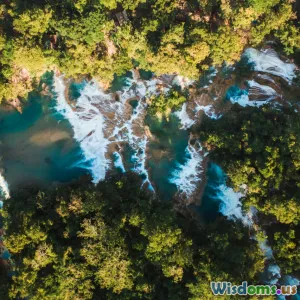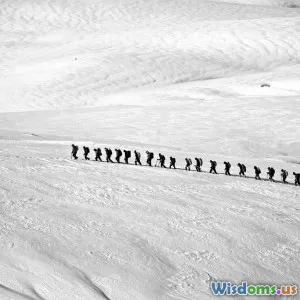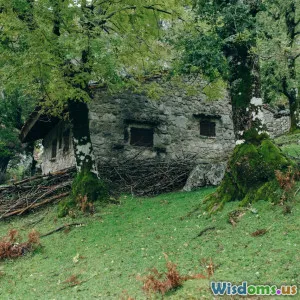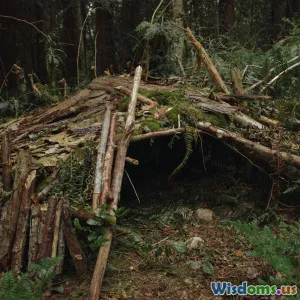
Where Are the Best Global Destinations for Safe Adventure Training
8 min read Explore the top global destinations offering safe, expert-led adventure training for mastering survival skills. (0 Reviews)
Where Are the Best Global Destinations for Safe Adventure Training?
Adventure training has become more than a pastime; it is a vital skill-building journey for many outdoor enthusiasts, survivalists, and thrill-seekers. But where can aspiring adventurers train effectively and, importantly, safely? This question leads us toward a pursuit of destinations worldwide that offer a perfect blend of rigorous survival training and controlled safety, under expert guidance, paired with breathtaking terrain. From rugged mountains and dense forests to arid deserts and icy tundras, the globe holds hidden gems for mastering survival skills in a trustworthy environment.
Why Adventure Training Requires Safe, Controlled Destinations
When your learning focuses on survival skills and adventure training, the margin for error is slim. Adventurers often face unpredictable weather, remote locations, and unfamiliar ecosystems that demand both physical endurance and mental fortitude. Safety doesn't mean diluting the experience—it means ensuring professional oversight, medical availability, and suitable terrain tailored to specific training goals.
Consider: The American National Outdoor Leadership School (NOLS) emphasizes that quality adventure education demands rigorous risk management coupled with real-world challenge (NOLS Annual Report, 2022). Crafting an environment where learners can push their limits but return safely is a delicate balance.
1. New Zealand: The Adventure Capital with Expert-Led Training Programs
New Zealand’s rugged landscape has earned it a reputation as a global adventure hotspot. With towering mountains, dense forests, and coastline wilderness, it offers incredibly diverse environments for survival training.
Why New Zealand?
- Professional Training Centers: NZAEE (New Zealand Association for Environmental Education) partners with outdoor providers offering courses in wilderness survival and mountaineering.
- Diverse Terrain: Fiordland National Park and the Southern Alps allow realistic scenario training, from mountainous wilderness navigation to coastal survival skills.
- Safety Infrastructure: New Zealand has robust search and rescue teams and medical services even in remote areas.
For example, the Off The Grid Survival School in Wanaka provides courses grounded in Māori knowledge, merging cultural insights with modern survival techniques. Trainees learn open-fire making, water sourcing, shelter-building, and more, all under certified instructors specializing in wilderness safety.
2. Canada: Expansive Wilderness and High Standards of Safety
With vast northern forests, Arctic landscapes, and numerous lakes, Canada is a survival enthusiast's dream classroom.
Key Highlights:
- Government-Approved Adventure Schools: Canada’s accreditation system enforces high safety and instructional standards for wilderness training schools.
- Diverse Climates: From the temperate rainforests of British Columbia to the tundras of Yukon, trainees can select environments based on their skill and interest.
- Indigenous Knowledge Integration: Some schools incorporate First Nations’ traditional knowledge, like edible plant identification and seasonal survival strategies.
The Boreal Wilderness Institute, located in Alberta, offers courses including backcountry survival, winter camping safety, and navigation. Their approach focuses heavily on realistic exposure combined with thorough risk mitigation — a perfect blend for learners motivated to master the terrain safely.
3. Norway: Nordic Wilderness for Cold Weather Survival Training
Norway’s sweeping fjords and Arctic Circle regions provide exceptional conditions to master cold-weather adventure and survival skills.
Highlights:
- Specialized Cold-Climate Training: With courses emphasizing hypothermia prevention, snow shelter construction, and ice navigation.
- Professional Adventure Companies: Organizations like Arctic Adventures offer guided survival weekends with seasoned instructors.
- Strong Emergency Response: Norway’s sophisticated mountain rescue teams provide extra assurance.
A pertinent example includes the Kirkenes Wilderness Center, where trainees experience realistic scenarios such as winter route-finding, snow survival shelters, and cold-water rescue simulations.
Insights from Erik Olsen, a Norwegian survival instructor with over 15 years of experience, highlight that “training in conditions similar to natural emergencies is invaluable – but it must be structured and supervised to avoid real danger.” This underscores the value of Norway’s controlled approach.
4. Costa Rica: Tropical Survival Training in Biodiverse Environments
For those wanting to master jungle survival techniques, Costa Rica’s lush rainforests and biological hotspots provide an immersive classroom.
Why Choose Costa Rica?
- Expert-led Programs Focused on Tropical Skills: Jungle navigation, sourcing food and water in rainforest conditions, and handling humidity-related challenges.
- Rich Biodiversity: Trainees learn to recognize poisonous plants, edible wildlife, and insect considerations in situ.
- Regulated Adventure Training Sector: The country emphasizes eco-tourism and responsible training, reducing environmental impact while maintaining participant safety.
Organizations like the Rainforest Adventure Institute specialize in multi-day survival curricula that use local guides and biologists to deepen understanding of the ecosystem alongside the physical challenges.
5. Australia: Outback Survival with Cultural Insights
Australia's vast desert and woodland regions set the stage for intense outback survival training.
Noteworthy Features:
- Simulated Harsh Conditions: Dry heat, scarce water, and large distances train participants in extreme resourcefulness.
- Integration with Aboriginal Survival Traditions: Sharing indigenous wisdom on water sourcing and land navigation.
- Facilities Near Remote Environments: Training bases often feature access to emergency communication and medical services.
The Australian Wilderness Survival School, located in Queensland, runs courses teaching fire-starting without tools, signaling techniques, and emergency shelter building. Their wilderness scenarios are simulated yet emphasize realistic safety protocols.
Conclusion: Finding the Balance Between Challenge and Safety
The best destinations for safe adventure training share core traits: incredibly varied terrain offering realistic survival challenges, well-regulated professional instruction, and robust safety and emergency response frameworks.
Whether it’s New Zealand's mountain diversity, Canada's expansive wilds, Norway's icy realms, Costa Rica’s rainforests, or Australia's outback, adventurers seeking to improve survival skills can find tailored, expert support globally.
Before enrolling in any training program, researchers should ensure the school’s safety records, instructor credentials, environmental ethics, and included emergency support meet high standards. Proper adventure training is not just about pushing limits — it’s about developing skills that will allow you to challenge nature confidently and awesomely, but with the highest degree of awareness and security.
Start your adventure wisely by choosing a destination committed to combining thrill with safety, anchoring your survival skills in the best conditions the planet offers.
References:
- NOLS Annual Report, 2022
- Boreal Wilderness Institute Course Descriptions
- Arctic Adventures Official Website
- Rainforest Adventure Institute Program Overview
- Interviews with Survival Instructors (personal communication)
Rate the Post
User Reviews
Popular Posts



















